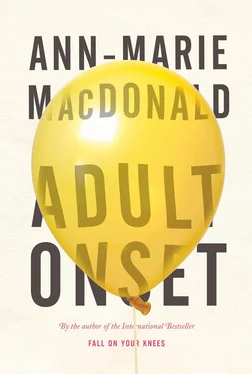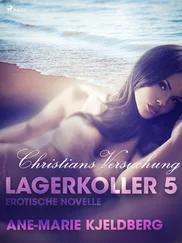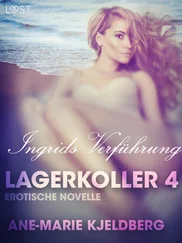“Not all girls are sissies,” she said. “Most of them are, but I’m not.”
“I know, Mister, you’re tough.”
And having been offered a sliver of space, she squeezed under the umbrella.
Brother and sister did, however, maintain a bond. When he started toddling, their mother would tie him around the waist with two diapers knotted end to end and fastened to a bar of his crib, “so he won’t climb out and hurt himself.” Sometimes at night Mary Rose would steal into his room, kneel at his crib-side and, closing her hands round the bars, whisper consolation. He would respond with pleading hazel eyes and downy brows — she cried too, because they were pretending he was in jail. She once made the mistake of untying him, which meant it was her own fault when he got out and pulled her hair. Mum hauled her away by the arm, which hurt but only because it was her sore arm anyhow.
By then they were living in Hamilton, “the Steel City,” beneath its yellow cloud that was visible for miles — you could not see the cloud when you were under it, but often you could smell it: rotten eggs. “That’s the smell of prosperity,” said Duncan. The smelters worked day and night, eternal flames shot from smokestacks into the sky, effluent ran from pipes into Lake Ontario, and framing it all like a dirty rainbow was the mighty Skyway bridge. Up there, wind buffeted cars and rocked the trucks, and anyone foolhardy enough to get out of their car with a camera might be blown over the rail.
It was winter. Aunt Sadie had come to stay while Uncle Leo was “sorting things out back home” again. They were outside playing, Andy-Pat was Michelined into his snowsuit, teetering on tiny galoshes. Mary Rose does not recall what precipitated it, but recalls vividly her aunt’s advice. “Dolly, don’t hit him in the face. Hit his little hands, like this.” Mary Rose watched as Aunt Sadie demonstrated the proper way to hit a child, taking Andy-Pat’s hand in one of her own and smacking it sharply with her other. “See? Don’t hit him anywhere on the head.” Smack . Andy-Pat’s face turned red and he cried.
They lived in Hamilton for nine months while Duncan did his MBA at McMaster University. Maureen started high school at Cathedral Catholic Secondary and played guitar in the groovy new folk masses, Andy-Patrick discovered that blobs of tar on the sidewalk could be chewed like gum, and Dolly had another miscarriage. Mary Rose entered grade three at St. Anne’s Catholic Elementary School and fell in love.
The sight of Lisa Snodgrass in the next row was like lemonade on a scorching day, like vanilla ice cream on a sore throat, like —Pay attention! Mary Rose looked up. Mrs. Peters resembled a pterodactyl with lipstick. She had a visible mole on her scalp and a frightening habit of smiling when displeased.
“Show me that note,” she said, beaming.
Mary Rose had not intended to pass the note, having written it only in order to see the words on paper. Mrs. Peters read it silently then looked at her strangely before saying, “That makes no sense at all,” and tearing it up.
Mary Rose waited until she was home to rewrite the note in pencil on a scrap of paper by the phone. She looked at the words for a long while, then for some reason she tore up that note too.

They moved to Kingston, where, for the first time, her parents purchased a house. Her father planted a flowering crab in the front lawn, its endearing sparseness reminiscent of Charlie Brown’s Christmas tree. “This tree will be flowering long after we’ve moved away again,” he said in the mournful tones of Scottish contentment.
They lived in a new subdivision. These were the days when children “went out and played”; there were woods and creeks that had yet to be tamed into suburban lots, and for endless summer days Mary Rose could “light out” like Huck and not return till supper, socks burred, runners soaked.
To get to the Royal Military College where her father worked you had to drive past the Dairy Queen, the Kmart, three prisons, the loony bin, Sir John A. Macdonald’s house — with his small bed and undersized boots that showed what life had been like before vitamins — Queen’s University, Kingston General Hospital and across the lift bridge to the stone archway that led to the ivy-bearded walls wherein her father taught economics, “the dismal science.” Eventually Maureen would get a weekend job lifeguarding at the pool there and meet Zoltan Zivcovic, an officer cadet whose pillbox hat and sticking-out ears made him look like a tall, serious monkey. Andy-Patrick moved from a crib into a room of his own equipped with everything Mary Rose could desire in the way of vehicles and weaponry, not to mention clothing — she felt like an imposter in girls’ clothes. But she continued to love her brother when he was sad, sick or asleep — he got mononucleosis shortly after they moved in and he was adorable.
Her father sent her off on the first day of school with a firm pat on the head, “Do it your way, Rosie.” She lined up outside Our Lady of Lourdes with the grade fives, awaiting the bell, conscious of the butterflies in her stomach aflutter with the secret of the miracle, You have skipped a grade! She looked up and down the line, assessing which girl would be the object of her crush, a worthy successor to Lisa Snodgrass … and stopped herself, suddenly aware that it was wrong. And they knew they were naked . Having crushes on girls was something to be left behind along with her place in the slow readers’ group. It belonged to a benighted past that need never cast its shadow so long as she did her best, then better than her best. She looked up and down the line again. And chose Danny Pinder. Another miracle. Our Lady made her become normal.
She was unable, however, to leave behind the soreness in her arm. It smelled of the grave.
“Maureen! Come, I need you!” cried Dolly.
It was the middle of the day, but her mother was taking a bath. They were not at school so perhaps it was the weekend. Mary Rose followed her sister up the stairs but Mo hurried in and closed the bathroom door behind her. She pressed her ear to it, then opened it a crack. Her mother was in the tub, the water was red. Maureen turned, saw Mary Rose and slammed the door in her face, shouting at the same time, “It’s okay, Rosie!” That night her mother was quiet and they got to order pizza.
It was the last “other.”
One summer day, Mary Rose ransacked the steamer trunk in the basement for Aunt Sadie’s sateen dressing gown from the forties, a flowing affair in gold and scarlet paisley, and other mothbally sundries — her mother’s nursing cape, a plastic sword from a giant bag of puffed rice — and she and Andy-Pat along with a couple of neighbourhood kids devised and put on a play. They wrestled the lawn mower and snow shovels out of the aluminum garden shed, using it and its dented sliding doors as a proscenium stage, thus linking forever the magic of theatre to the smell of grass cuttings and motor oil. The Curse of Roderigo . Mary Rose had cast five-year-old Andy-Pat in the title role, furnishing him with a hunchback courtesy of a couch cushion, but he insisted on playing the damsel in distress, “Lady Jenniah,” with lipstick, fan and Aunt Sadie’s sateen.
She summoned the family and neighbours to the driveway, where they watched from the comfort of lawn chairs. The sun set, swords were drawn, Lady Jenniah wept and danced, Roderigo fought and swore to avenge her death. Andy-Pat was brilliant. Everyone clapped. Afterwards her father took her aside, “Don’t be getting your brother to dress up like a girl, Mister.”
Читать дальше













